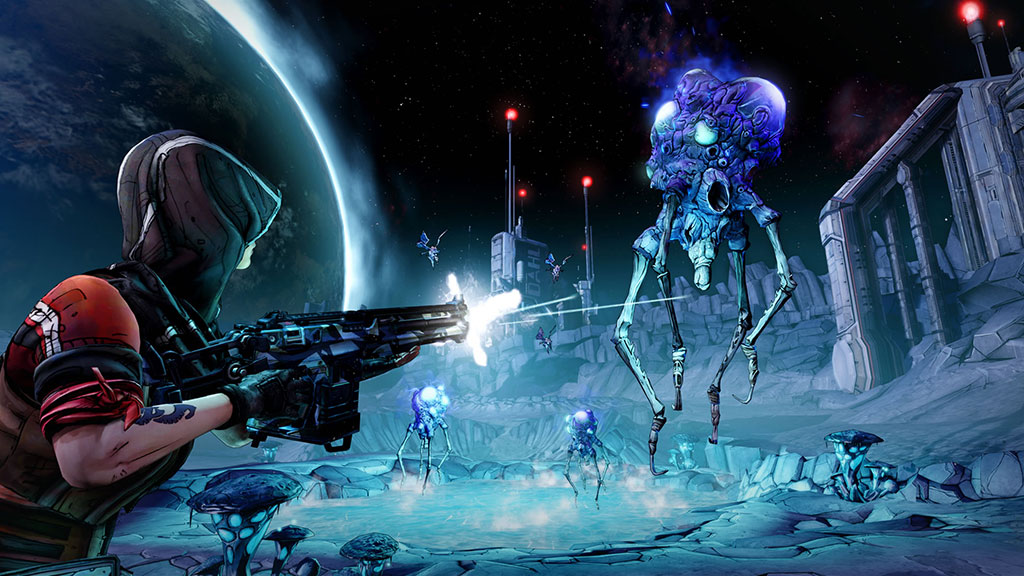 Sunset Overdrive. Bayonetta 2. Super Smash Bros. Borderlands: The Pre-Sequel. What do all these games have in common?
Sunset Overdrive. Bayonetta 2. Super Smash Bros. Borderlands: The Pre-Sequel. What do all these games have in common?
For one, they’re some of this fall’s biggest releases. Also? They’re all part of a growing number of video games about video games.
Take a look at Sunset Overdrive’s E3 trailer. This was the game’s big coming out event, but there’s not a shred of gameplay footage. Instead, the video focuses on calling out modern gaming clichés: warehouses full of crates, cover-based-shooting mechanics, and ultra-violence. At the end of the trailer, the unnamed protagonist looks directly at the camera and shrugs. “It’s a f*cking video game,” he says. The message couldn’t be clearer: don’t take this seriously.
Bayonetta 2 is similarly over-the-top, but unleashes its violence and sexism with a sly nod-and-wink to the audience. Everything is just too crazy. It’s clearly a game. Like other titles, Bayonetta 2 rewards vigilant players with alternate — and increasingly revealing — costumes for the main character. This time, however, the outfits are based on popular Nintendo characters — Princess Peach and Link, sure, but also Super Mario and Fox McCloud. That’s the least sexy “sexy” reward ever, and the developers know it.
Meanwhile, if the Borderlands series doesn’t outright break the fourth wall, it certainly has a long history of bending it. There’s a solid brawler underneath Super Smash Bros’ Nintendo-themed skin, but the whole package wouldn’t be nearly as compelling without its blatant play on nostalgia.
Retro City Rampage DX, which came out this week for the PlayStation 4, continues this trend. Retro City Rampage started as a homemade remake of Grand Theft Auto 3 for the original Nintendo Entertainment System. It’s is a top-down open-world title with perfectly adequate gameplay, but the game’s real draw is its humor. Retro City Rampage is absolutely full of references to 8-bit classics, from small Easter eggs to full levels mimicking Bionic Commando and The Legend of Zelda. And like Sunset Overdrive, Bayonetta, and Borderlands Retro City Rampage employs over-the-top violence and profanity for laughs. It’s a f*cking video game, alright? Don’t take it seriously.
Unfortunately, simply referencing something doesn’t make it parody. Good satire has a message. Intentionally filling a game with sex, violence, and clichés because, hey, that’s what games do? That’s not making any kind of deeper point; that’s just an excuse to fill your game with sex, violence, and clichés.
I think we can do better. If a game is going to play up its gaminess, it should try to do something with it. That’s why Bioshock’s “Would You Kindly?” scene works so well. It’s a moment that breaks the fourth wall to call attention to how we engage with games, encouraging us to question on-screen prompts instead of just blindly following them.
For another example, consider Brothers: A Tale of Two Souls. That game associates different buttons on the gamepad with specific characters. It’s a system that’s intentionally awkward, and you’ll never quite forget that you’re holding a controller. As a result, every action that you take is a deliberate decision, not a mechanical reflex. When the control scheme changes late in the game, it carries real emotional consequences. After playing, you’ll never press buttons quite the same way again.
Don’t get me wrong; I like over-the-top and crude humor, and I thoroughly enjoyed all of the games above. But gaming is a medium that, more than almost any other, relies on a sense of immersion. If you’re going to break that? Make sure you have something to say.



